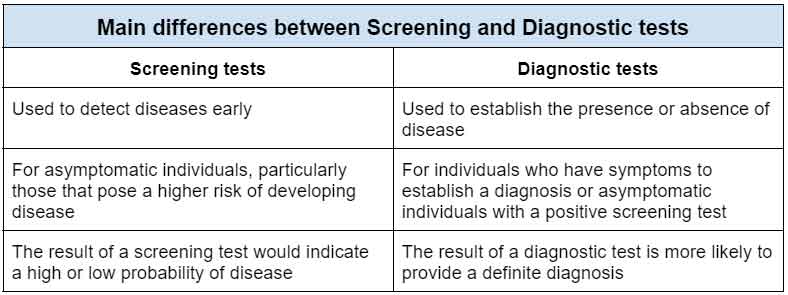A diagnostic test is a procedure used to identify a physical condition or its cause. Diagnostic tests are used in a clinical exam setting to detect disfunctions or disorders and assist in diagnoses.
Diagnostic tests are each individually designed to identify specific characteristics of a condition. For example, a diagnostic test for Diabetes searches for physical characteristics related to Diabetes (blood glucose levels after eating or not eating).

Diagnostic tests are a good way to rule in or rule out a diagnosis. Using multiple diagnostic tests is known as troubleshooting. This is a great technique for narrowing down the cause of a condition.
Any time you visit your doctor with new injuries or symptoms, they will most likely request that you go through several diagnostic tests. 13 billion of these tests are performed every 12 months in the United States.
WHAT ARE THE DIFFERENT KINDS OF DIAGNOSTIC TESTS?
There are numerous types of diagnostic tests, but imaging tests are some of the most beneficial. Listed below are some of the most common diagnostic imaging exams.
- X-rays :- X-rays are taken for many reasons, such as detecting the cause of pain, assessing the severity of an injury, monitoring the progress of a previously diagnosed disorder, or to assess the effectiveness of the current treatment. X-rays use radiation and radiowaves to produce photos of your bones and organ systems. It is the most extensively used non-invasive diagnostic exam today. X-rays are normally the primarily requested clinical imaging procedure for damage to bones or chest obstructions.
- CT scan :- CT scans combine a series of X-rays taken from different angles around your body and creates cross-sectional images, or slices, of your bones, blood vessels and soft tissues. These scans provide much more detailed information than plain X-rays do.
- MRI :- An alternative to CT scans, MRI uses radiowaves with magnetic fields instead of the ionizing radiation used in CT scans. MRI’s provide detailed pics of what’s inside the body. The lack of radiation makes MRI’s safer than CT scans, but doing an MRI can take up to several hours.

- Mammogram :- Mammography is used as a screening and diagnostic tool for women to locate atypical growths within the breast. It is used to diagnose breast cancer. With the digitization of mammography, radiation dosage is very low.
- Ultrasound :- An ultrasound is performed to generate snapshots of organs and blood vessels via the use of high-frequency sound waves. Since there is no radiation, it’s the preferred test for pregnant women. It uses sound waves, a transducer, and a laptop to create a moving picture of the internal organs. Besides being used for imaging, it’s also utilized in physical treatment, particularly ultrasound-guided remedies for pain.
- PET scans :- PET scans are used to monitor normal and abnormal metabolic activity in your body. Using a radioactive tracer, PET scans can reveal conditions that are not picked up by other imaging exams.
WHAT KIND OF DIAGNOSTIC TESTS DO WE DO AT ZENITH?
Here at Zenith, we utilize many different diagnostic approaches to identify what is causing your pain and discomfort. We use observational assessments in our new patient exams to gather a history of your complaint that helps us to compile a list of potential diagnoses. Then, we use a combination of orthopaedic tests and x-ray imaging to rule in and rule out potential diagnoses. These tests give us the confidence to identify the cause of your issue and how to address it.

If a diagnostic exam has been recommended for you or a family member, don’t hesitate to get in contact with the diagnostic specialists at Zenith!
Our compassionate crew of radiologists and assistants recognize how anxiety-inducing undergoing a diagnostic technique may be, and we are here to help.
If you have any questions about our imaging or diagnostic approaches, call us at (972) 210-0033. We welcome you at Zenith!
